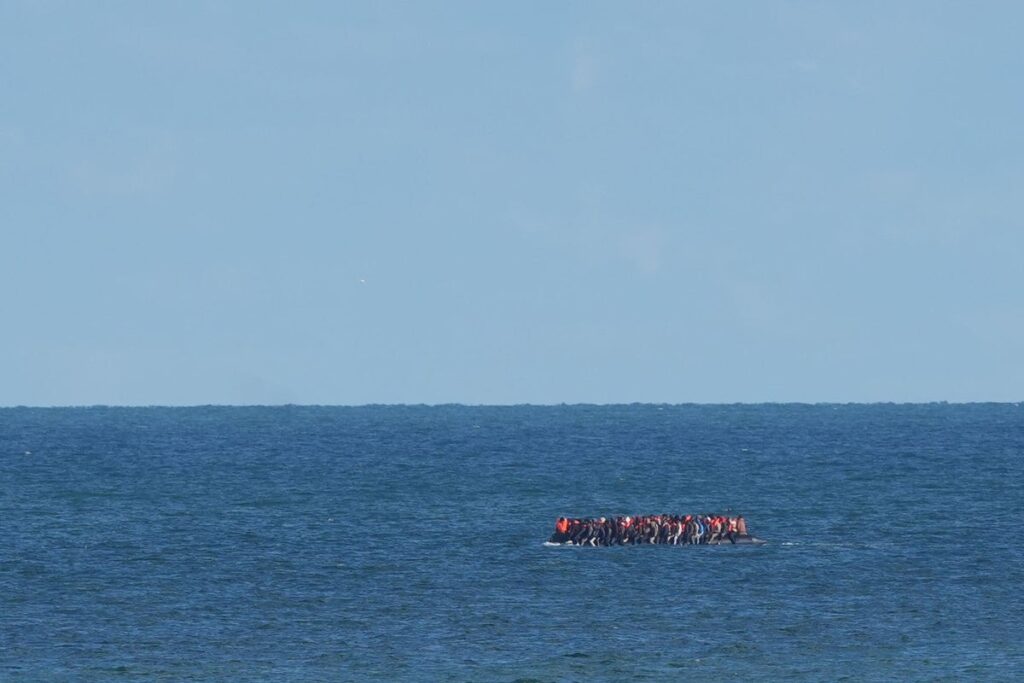Hundreds of asylum seekers are set to be moved into military barracks as ministers scramble to find a way to end the use of hotels to house migrants.
The Home Office has confirmed that Crowborough Training Camp in East Sussex and Cameron Barracks in Inverness will be used temporarily to house a total of around 900 men under the plan.
Downing Street suggested on Tuesday that the scheme would be worth it to help quell public discontent, even if it costs more than using hotels.
Asked if the costs of using military sites will be higher than using hotels, the Prime Minister’s official spokesman said: “The costs will vary site by site, but our priorities are security and fairness.”
Pushed later on whether this meant ministers thought barracks were a better option even if costs were higher, the spokesman said that the matter is “also a core issue of public confidence. The public is very clear it does not want asylumseekers housed in hotels, and neither does the Government.”
Small-boat migrants will start being housed in the military accommodations by the end of next month. Officials are also working with the Ministry of Defence to identify other disused sites that can be used in the coming months in a bid to get a grip on the asylum accommodation crisis.
There are also plans to build pop-up modular units, which have previously been used to tackle prison overcrowding, on some of the sites.
The plans come as Labour ramps up its bid to move tens of thousands of migrants out of hotels after huge controversy surrounding their use.
On Monday, a parliamentary committee described the policy of using hotels to house asylum seekers as “failed, chaotic and expensive”, and accused the Home Office of squandering billions of pounds as a result of incompetence.
But the committee also said that the use of military sites is likely to cost more than using hotels, and that it would present safety issues and legal risks. Any plans are also likely to face significant local opposition.
Dame Karen Bradley, chair of the committee, cautioned ministers to “act carefully” when considering large sites. She added: “We have seen in the past that rushing in to sites that aren’t fit for purpose brings more problems.
“Before any asylum seekers are moved to these new sites, the government must make sure that the accommodation is of suitable quality and the support services are there”.
Charities supporting refugees slammed the plans on Tuesday, with Jacob Burns at Médecins Sans Frontières saying it was “a pointlessly cruel and costly move that will do nothing to deter those seeking safety in the UK”.
Mr Burns pointed to conditions at former military base RAF Wethersfield, the Home Office’s largest asylum site, saying: “Our medical teams have seen first-hand the devastating impact of this approach at RAF Wethersfield in Essex, where prison-like conditions, barbed wire, and constant surveillance caused widespread and serious psychological distress”.
Enver Solomon, chief executive of the Refugee Council, said the government was “exchanging one failed approach with another”.
Steve Smith, CEO of Care4Calais, added: “How much evidence does the government need that camps are bad for people’s health and wellbeing? We’ve had Napier, Penally and Wethersfield, and hunger strikes, protests and attempted suicides have been a regular occurrence at all of them”.
Labour has pledged to end the use of hotels by 2029, but the prime minister has reportedly told ministers in private that he wants to end the practice within a year. Sir Keir Starmer has said he is “frustrated and angry” about the “mess” inherited by Labour in respect of the asylum system.
Defence minister Luke Pollard told Sky News on Tuesday that ministers want to “go faster” in closing the hotels, and that the Ministry of Defence is “stepping up”.

He explained: “We are looking at the sites that we have available where we could house asylum seekers, allowing the Home Office to close more asylum hotels faster. It’s right that we step up and support our Home Office colleagues in this respect, because I don’t think anyone wants to see asylum hotels open.”
Both of the military sites were used to accommodate Afghan families evacuated during the withdrawal from Kabul in 2021. Those families were resettled elsewhere, and that process was completed earlier this year.
It is reported that the Scottish site will house around 300 people, while the site in Sussex will hold around 600.
On Monday, housing secretary Steve Reed said the government was looking at “modular” buildings to ensure that the new sites can be ready in a short timeframe, as part of the plan to end the use of hotels “entirely”.
Pop-up cabins are already being used to expand capacity at former military base RAF Wethersfield, in Essex.

Plans had been floated to install cabins at RAF Scampton, in Lincolnshire, but this idea was scrapped when Labour came to power.
Building company Portakabin has also said it is open to doing a deal with the Home Office to provide emergency prefabricated accommodation for asylum seekers.
As of June this year, around 32,000 asylum seekers were being housed in hotels, down from a peak of more than 56,000 in 2023, but 2,500 more than at the same point last year.
The expected costs of Home Office accommodation contracts for 2019-2029 have tripled from £4.5bn to £15.3bn, following what the Commons home affairs committee called a “dramatic increase” in demand.
Earlier this month, the number of migrants who had crossed the Channel in small boats in 2025 surpassed the total for the whole of 2024.
A Home Office spokesperson said: “We are furious at the level of illegal migrants and asylum hotels. This government will close every asylum hotel. Work is well underway, with more suitable sites being brought forward to ease pressure on communities and cut asylum costs.”


